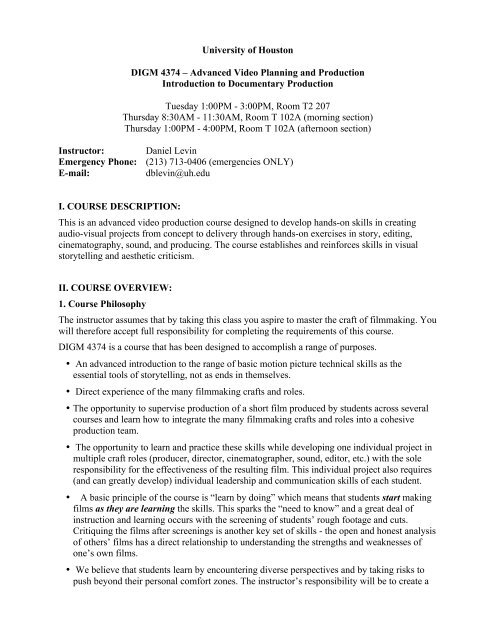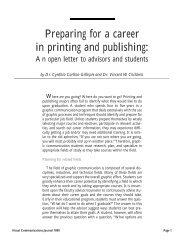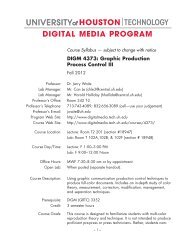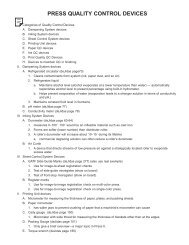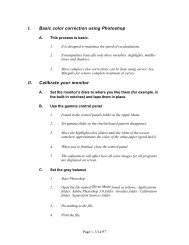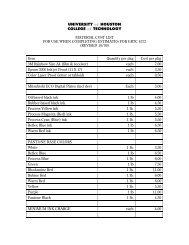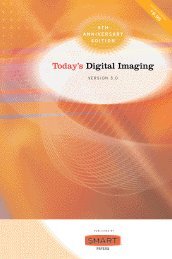DIGM 4374 Syllabus (Spring 2012) - Graphic Communications ...
DIGM 4374 Syllabus (Spring 2012) - Graphic Communications ...
DIGM 4374 Syllabus (Spring 2012) - Graphic Communications ...
Create successful ePaper yourself
Turn your PDF publications into a flip-book with our unique Google optimized e-Paper software.
University of Houston<br />
<strong>DIGM</strong> <strong>4374</strong> – Advanced Video Planning and Production<br />
Introduction to Documentary Production<br />
Tuesday 1:00PM - 3:00PM, Room T2 207<br />
Thursday 8:30AM - 11:30AM, Room T 102A (morning section)<br />
Thursday 1:00PM - 4:00PM, Room T 102A (afternoon section)<br />
Instructor: Daniel Levin<br />
Emergency Phone: (213) 713-0406 (emergencies ONLY)<br />
E-mail:<br />
dblevin@uh.edu<br />
I. COURSE DESCRIPTION:<br />
This is an advanced video production course designed to develop hands-on skills in creating<br />
audio-visual projects from concept to delivery through hands-on exercises in story, editing,<br />
cinematography, sound, and producing. The course establishes and reinforces skills in visual<br />
storytelling and aesthetic criticism.<br />
II. COURSE OVERVIEW:<br />
1. Course Philosophy<br />
The instructor assumes that by taking this class you aspire to master the craft of filmmaking. You<br />
will therefore accept full responsibility for completing the requirements of this course.<br />
<strong>DIGM</strong> <strong>4374</strong> is a course that has been designed to accomplish a range of purposes.<br />
• An advanced introduction to the range of basic motion picture technical skills as the<br />
essential tools of storytelling, not as ends in themselves.<br />
• Direct experience of the many filmmaking crafts and roles.<br />
• The opportunity to supervise production of a short film produced by students across several<br />
courses and learn how to integrate the many filmmaking crafts and roles into a cohesive<br />
production team.<br />
• The opportunity to learn and practice these skills while developing one individual project in<br />
multiple craft roles (producer, director, cinematographer, sound, editor, etc.) with the sole<br />
responsibility for the effectiveness of the resulting film. This individual project also requires<br />
(and can greatly develop) individual leadership and communication skills of each student.<br />
• A basic principle of the course is “learn by doing” which means that students start making<br />
films as they are learning the skills. This sparks the “need to know” and a great deal of<br />
instruction and learning occurs with the screening of students’ rough footage and cuts.<br />
Critiquing the films after screenings is another key set of skills - the open and honest analysis<br />
of others’ films has a direct relationship to understanding the strengths and weaknesses of<br />
one’s own films.<br />
• We believe that students learn by encountering diverse perspectives and by taking risks to<br />
push beyond their personal comfort zones. The instructor’s responsibility will be to create a
classroom environment that encourages honesty, experimentation, and growth. The technical<br />
proficiency of a <strong>DIGM</strong> <strong>4374</strong> movie is as important as the quality and originality of what it is<br />
saying.<br />
• Personal integrity, regard for safety and wellbeing of crew and cast, and willingness to put<br />
ethics ahead of getting the “great shot” are important elements in <strong>DIGM</strong> <strong>4374</strong> and are often<br />
the qualities of an experience remembered long after the films themselves have faded.<br />
• If your film contains audio or video that might be offensive to some, you should say so<br />
before screening it. Your right to show your work the way you see fit doesn’t preclude<br />
someone else’s right not to be exposed to what he/she could consider objectionable material.<br />
2. <strong>DIGM</strong> <strong>4374</strong> Filmmaking Goals:<br />
Upon completing the course, students will be able to:<br />
• Experiment with personal expression through cinema;<br />
• Create interactions between images and sounds for expressive purposes;<br />
• Demonstrate capability in creating and developing audio-visual project concepts, creating<br />
project pitches and proposals, producing, directing, photographing, editing, and creating<br />
sound;<br />
• Show ability to lead and be the project’s driving force;<br />
• Develop starting ideas into complete short films;<br />
• Show skills in characterization and story telling;<br />
• Deliver and receive effective critiques of work in progress;<br />
• Establish ethical and aesthetic standards for movie-making and critiquing.<br />
3. Additional Filmmaking Fundamentals That Will Be Explored:<br />
• What is your story really about and how are you going to tell it?<br />
• What is the “dream” you are making and the hidden forces at work?<br />
• Where are you going to “put the camera” and why?<br />
• Developing critical creative dialogue with your subjects and colleagues.<br />
• Pitching your ideas with a sense of story structure, character, the audience, the costs and<br />
being able to learn from creative “testing” and “feedback.”<br />
• Taking complete responsibility for every aspect of your work. No excuses.<br />
• Working in a collaborative fashion to help others improve their work through careful and<br />
thoughtful dialogue and supportive “what if” attitude.<br />
• Learning to respect the process of filmmaking as a collaborative art form and experience.<br />
4. Production Requirements:<br />
a. Complete one personally originated documentary project, which you write, produce, direct,<br />
operate camera for, light, create sound for and edit. The film will be made following<br />
conventional stages of documentary production in which students learn to develop a project in<br />
sequential steps of growing complexity. Individual projects are shot, edited and screened<br />
according to the class calendar schedule. Students will be assigned to one of three groups (A, B,<br />
or C) and will share camera equipment with other classmates.<br />
2
. Project Requirements:<br />
• LENGTH/FORMAT: All films will be made in HDV digital video (DV NTSC). Projects<br />
are to be no more than 14 minutes long.<br />
• DIALOGUE: There is no restriction on sync (on-camera) dialogue. However, emphasis<br />
should be made on story, characterization, and physicality of characters. There will<br />
absolutely be NO SIT DOWN INTERVIEWS.<br />
• SOUND: The project will have a "mixed" track, that is, a blending of two or more<br />
elements. All projects will be expected to have a full sound design including all<br />
conventional elements: dialog, sound effects, and backgrounds. THERE WILL BE<br />
ABSOLUTELY NO BACKGROUND MUSIC AND NO VO NARRATION.<br />
• LABELS/COUNTDOIWN/CREDITS: When brought to class, tapes should be labeled<br />
with your name, class number and title. Begin class screenings with an SMPTE<br />
COUNTDOWN, followed with Main Title and credits for cast and crew.<br />
• Complete a Filmmaker’s Critique for each of your screenings. Include a brief synopsis,<br />
main idea, summary of major learning and any problems. All documents are to be<br />
TYPED, and submitted at the beginning of the screening day. * No project will be<br />
screened unless accompanied by the filmmaker’s critique.<br />
• Complete a critique for each screening of your classmates’ projects. Submit to instructor<br />
and to the filmmaker after each screening.<br />
III. DEADLINES:<br />
All assignments are to be handed in at the beginning of the class, even if the movie-maker feels<br />
that it is unfinished. We consider these assignments as works-in-progress, and the emphasis is on<br />
process. Completion of each class assignment on time for in-class screening is imperative for<br />
successful completion of your film. Do not use class time to finish your project, come on time so<br />
that you can see your classmates’ films. Do the final outputting of your film at least 4 hours<br />
before screening time to give yourself time for technical problems.<br />
IV. PLAN PROJECTS WITHIN YOUR RESOURCES<br />
Calculate the time you need for all your coursework (not just <strong>DIGM</strong> <strong>4374</strong>), and schedule shoots<br />
and editing within your limits. If there is one thing students tell me about handling the course, it<br />
is that they wish they had planned their projects more carefully, and managed their time better.<br />
The workload is heaviest in the first few weeks, because you’ll be getting into habit of using the<br />
camera, lights, and editing system. Not having enough time to shoot or no equipment available at<br />
the time when you needed it are NOT valid excuses.<br />
IV. READING<br />
Required Text:<br />
Directing the Documentary by Michael Rabiger, Fifth Edition, Focal<br />
Press, 2009<br />
3
V. REQUIRED WRITTEN ASSIGNMENTS:<br />
Personal Critique:<br />
This self-critique is an important part of your film project (and grade) and reflects the learning<br />
process you went through. One copy of your TYPED critique (using the following format as a<br />
guide) must accompany each screening of your work (your work will not be screened without<br />
this critique):<br />
• Filmmaker’s name. Project title, production stage, and date.<br />
• Brief, clear synopsis of the story- what we actually see on screen.<br />
• Intent- how you wanted to affect us.<br />
• Source of the main idea for the story or the character that you started with and its<br />
importance to you.<br />
• Effectiveness of your footage and its potential into making the cut.<br />
• Main tension/conflict: be specific, look for this element in all films.<br />
• Strengths of the film.<br />
• Problem areas and “what I want to learn to do better.”<br />
• Journal-type notes on your own learning process, discoveries, and frustrations.<br />
Project Critiques:<br />
After each screening by a student we each prepare a written critique. Please use the following<br />
format:<br />
• Name of Film Maker, Project Title, Production Stage<br />
• INTENT: The theme, premise or basic concept the filmmaker was trying to<br />
communicate.<br />
• SYNOPSIS: A very brief overview of the story line.<br />
• STRENGTHS: What worked best and why?<br />
• SUGGESTIONS: Where is there room for improvement?<br />
• A brief discussion on the merits of the work will follow.<br />
• Your Signature<br />
VI. GRADES:<br />
Grading Criteria:<br />
Poor<br />
Projects exhibit basic technical and/or aesthetic deficiencies that make it obvious the student has<br />
not mastered the techniques necessary to handle more advanced classes. Inability to demonstrate<br />
satisfactory growth by integrating feedback into subsequent work. Minimal participation in class<br />
discussion and exercises. Poorly developed written and/or oral critiques. Failure to meet<br />
deadlines. Inability to develop accessible characters and stories.<br />
Average<br />
• All assignments completed on time.<br />
• High level of constructive class participation in exercises, discussions and written<br />
critiques.<br />
• A minimum of two screenings, which clearly demonstrate technical proficiency.<br />
• Evidence that feedback has been integrated into subsequent work.<br />
4
• Steady improvement in the ability to tell a story simply and concisely.<br />
Very Good<br />
• The entire above plus student attempts projects which explore original concepts.<br />
• A minimum of three screenings, which are both technically and aesthetically<br />
outstanding.<br />
• A unity of form and content.<br />
• A sound design, which is consistently creative and brings added depth to the project.<br />
• Student assumes a leadership role in class discussions and exercises.<br />
Superior in All Respects<br />
• All of the above plus; project exhibits a unique application of visual and dramatic<br />
structure<br />
• Exceptional ability to use craft technical skills to enhance story.<br />
• Thematic concepts are communicated with intensity on both an emotional and<br />
intellectual level.<br />
• Innovative use of sound to open up new levels of meaning not inherent in the visuals.<br />
• Consistently original and fully developed characters.<br />
Final evaluations for successful completion of the course will be based upon finishing all<br />
projects, class participation, and attendance.<br />
NB: UNDER NO CONDITION WILL GRADES EVER BE DISCUSSED IN CLASS. NO<br />
EXCEPTION. To discuss your grade, please make an appointment.<br />
Grading Scale<br />
The following number points to letter grade scale will be followed for this course:<br />
Grade Summary<br />
93 – 100% = A 77 – 79% = C+<br />
90 – 92% = A- 73 – 76% = C<br />
87 – 89% = B+ 70 – 72% = C-<br />
83 – 86% = B 65 – 69% = D+<br />
80 – 82% = B- 60 – 64% = D<br />
0 – 59% = F<br />
Class Grade:<br />
Screenings: 60%<br />
Final projects: 30%<br />
Participation 10%<br />
VII. PROCEDURAL ISSUES:<br />
1. Sound Design:<br />
For films produced in this class, I would like you to focus on the expressive potential of visual<br />
and aural images. Use body language and physical behavior to reveal a character’s emotions,<br />
attitudes and problems. It is what the characters do rather than say that is important. Remember<br />
what Hitchcock said: "to photograph people talking is not filmmaking." Thanks to non-linear<br />
editing systems all sound effects, music cues, voice-overs etc. can be placed in an exact and<br />
5
permanent relationship with the picture. Take advantage of this to create an expressive sound<br />
design, which builds emotional impact.<br />
2. Deadlines:<br />
All due dates as outlined in the class schedule are firm. Deadlines are sometimes onerous but<br />
they are a harsh reality in the film business. All projects and written assignments are to be<br />
delivered to the instructor at the beginning of class.<br />
ALL SUBSEQUENT WORK IN THE COURSE BUILDS UPON PREVIOUSLY<br />
SUBMITTED ASSIGNMENTS, THEREFORE COMPLETING ALL ASSIGNMENTS<br />
ON TIME IS IMPERATIVE. Besides, being on time is a good professional habit and an<br />
integral part of the discipline of filmmaking.<br />
The class will be divided into three groups: A, B and C. Project due dates are staggered by group<br />
as per the class schedule. Group A projects, for example, are all due the same day followed a<br />
week later by group B and so forth. Again, every project is to be turned in at the beginning of the<br />
class, even if the filmmaker feels that it is unfinished.<br />
<strong>DIGM</strong> <strong>4374</strong> films are works-in-progress and the emphasis is on process. Being on time is part of<br />
the discipline of filmmaking and I encourage you to work on developing time management<br />
skills, especially if you have a culture of missing due dates. I can assist you with “back-up” ideas<br />
that can be used in the event your current project falls completely apart. NOTE: Films arriving<br />
late (after the start of class) will have a grade penalty and will be screened at the instructor's<br />
discretion.<br />
3. Facilities:<br />
The school will provide digital cameras and editing stations. The cameras and editing stations<br />
will be shared between groups.<br />
4. Titles & Credits:<br />
Each project screening should include the title of the film and credits listing the director, cast,<br />
and crew, others if needed. Be sure to acknowledge copyrighted material, music and story<br />
sources, etc.<br />
5. Reel Preparation:<br />
Each reel should be clearly labeled with you name, class number, title and project stage (i.e. Cut<br />
2). Begin each show with the SMPTE countdown leader. After the 2 seconds of black, fade in the<br />
first shot or title card of your project. Pre-cue your tapes before coming to class screening.<br />
VIII. SAFETY:<br />
Filmmaking can be an unpredictable and even dangerous undertaking at times so use common<br />
sense when shooting. Under no circumstances is it permissible to do projects that require stunts<br />
or special effects, which might compromise the safety of the crew, the actors, or passersby.<br />
Please pay particular attention to three concerns: Weapons, stunts and vehicles. Such things as<br />
explosions, falls, car chases, fires, blood spurts, real weapons, tying into electrical mains,<br />
shooting in unsafe areas, interfering with the flow of traffic, shooting in a moving car etc.<br />
are strictly forbidden.<br />
Our intent is not to limit your creativity but to assure your physical well-being. Use common<br />
sense: do not shoot alone at night; do not leave equipment in your car (not even the trunk) for<br />
any length of time. Work with others in the class whenever possible.<br />
6
NB: NO WEAPONS OR GUNS OF ANY KIND. NOT EVEN SQUIRT GUNS.<br />
Health & Well-Being:<br />
Film production is intense. But an important aspect of production is learning to manage one's<br />
time, energy and health. This translates into scaling projects to a size that is do-able, having<br />
back-up ideas, locations, equipment and actors in case of problems (weather, accidents, etc) and<br />
realistically estimating the workload. If you are feeling overwhelmed, discuss your experiences<br />
with fellow students. Chances are they too are experiencing pressure but, as the semester<br />
progresses, you will be amazed at how much you are capable of and how quickly you become a<br />
seasoned filmmaker. Regardless of the circumstances, don’t hesitate to ask for help. If you have<br />
an ethical or professional dilemma or need to discuss your story ideas or progress, email me.<br />
There are no dumb questions and to struggle alone is not necessary or recommended. Ask for<br />
and offer your classmates help on their projects. One important bit of advice is to stay organized<br />
and be realistic. This translates to:<br />
• Keep projects small and feasible.<br />
• Don't overshoot.<br />
• Always have a few back-up ideas in case the current project falls apart.<br />
• Work well in advance. Be always planning the next step.<br />
• Be prepared!<br />
Students with Disabilities:<br />
The University of Houston is committed to providing qualified students with a disability an equal<br />
opportunity to access the benefits, rights and privileges of school services, programs and<br />
activities. The University of Houston provides reasonable accommodations to students with<br />
documented disabilities.<br />
IX. ETHICS & EXPECTATIONS:<br />
It is critical to guard your opportunity to learn. Do not relinquish it to someone more<br />
experienced. I expect you to operate your own camera, set your own lights, direct your own<br />
characters, and edit your own film. Keep projects simple enough to handle in the allocated<br />
amount of time with the resources you are given. Work together with other students -- it’s safer,<br />
more effective and more fun!<br />
Making movies involves additional issues of professional conduct off campus. Student<br />
filmmakers need to observe the highest professional standards of behavior with documentary<br />
subjects, crew, and location owners. The behavior of each class affects the reputation of the<br />
entire University.<br />
Learning is not a spectator sport. You are responsible for learning. For learning to happen you<br />
must take an active role in the process. You must come to each class prepared to learn from the<br />
lectures and from each other. This will require you to prepare the weekly assigned project. Being<br />
prepared will enable you to intelligently participate in discussions and to construct a foundation<br />
of knowledge on which you can build subsequent learning and to develop a thought process that<br />
integrates concepts together.<br />
During this course I do not just lecture about content. Instead, you help lead the class by telling<br />
us what you know and what you are learning. You will engage in learning tasks during class that<br />
will require you to use a variety of reasoning strategies to address issues and problems. You will<br />
7
write reflectively about what you are learning, how it relates to what you already know and how<br />
you might apply an idea to an actual situation.<br />
By choosing to take this class you agree to fulfill the following expectations:<br />
• Class time must be spent in active participation.<br />
• All assignments must be submitted on their due dates to receive a grade. Any work that is<br />
late will be penalized. Work that is not turned in will be averaged as a zero.<br />
• There will be NO make-up assignments.<br />
• PLAN AHEAD. Documented mitigating circumstances may exempt an assignment from<br />
the “late-zero” with the approval of the instructor, if the assignment is completed within<br />
an agreed upon timetable. In these circumstances, an “Exception Contract” agreement<br />
must be signed. Only one such agreement will be allowed per student during the<br />
semester.<br />
• ACADEMIC HONESTY IS EXPECTED. A student may be penalized, suspended or<br />
expelled for academic dishonesty, including plagiarism.<br />
Attendance Policy<br />
Class attendance is mandatory. In each class we discuss assignments of increasingly growing<br />
complexity that students will use to make the final film. Students with perfect attendance will<br />
have their final grade adjusted upward by one letter grade step, i.e., a C- to C or a B+ to A-.<br />
Students missing one class will face no penalty. All subsequent absences will be penalized by a<br />
grade of ZERO for that day’s assignment. Tardy arrivals after role is taken will count toward<br />
absences. Chronically arriving to class late is highly disrespectful to other students and to the<br />
instructor. Those arriving late to class risk being locked out of class.<br />
Student Conduct Policy<br />
Disruptive or inappropriate behavior is not permitted. Definition of such behavior is the sole<br />
judgment of the instructor. This will include, but is not limited to:<br />
• Policy regarding cell phones, laptop computers or any other electronic device: All<br />
cell phones, laptop computers and other electronic devices must be turned off before<br />
entering the classroom. Anyone whose cell phone, blackberry or any other device<br />
disturbs class or who is found text-messaging or reading email during the class time will<br />
have 2 points deducted from their final grade for the first offense and 3 points for each<br />
subsequent offense. One warning will be given before this penalty applies.<br />
• Talking amongst students; passing notes.<br />
• Comments that are made to distract from the class.<br />
• Disrespectful comments to or about anyone or any group of people.<br />
• Food shall NOT be permitted in the classroom.<br />
• Do not attempt to discuss grades before, during or after class hours. Please make an<br />
office appointment for these discussions.<br />
Disclaimer<br />
This syllabus and the associated schedule are subject to change at the discretion of the instructor.<br />
Every effort will be made to communicate changes to students, but this may not always be<br />
possible. All changes will be made with the intent of improving the original course objectives<br />
and/or enhancing the students learning centered experience.<br />
8
Class Schedule<br />
Week 1:<br />
(Jan 18)<br />
(Jan 20)<br />
Introduction to class, Direct Cinema/Cinema Verite<br />
Course assignments:<br />
Short film – form groups<br />
Lecture: Direct Cinema/Observation<br />
Film: Place of Birth by Pawel Lozinsky<br />
Setting guidelines and priorities for the course project<br />
Film: Sherman’s March by Ross McElwee<br />
Reading: Rabiger, Ch. 1-3<br />
Week 2: Setting sketch<br />
(Jan 24) Lecture: Character environment<br />
Film: Prince is Back by Marina Goldovskaya<br />
(Jan 26) Film: Grey Gardens by Albert and David Maysles;<br />
Reading: Rabiger, Ch. 5-6<br />
Week 3: Interview styles and techniques<br />
(Jan. 31) Screening: Group A: Setting sketch<br />
Lecture: Interview styles and techniques<br />
Film: 3 Songs About Motherland by Marina Goldovskaya<br />
(Feb 2) Film: Fog of War by Errol Morris<br />
Reading: Rabiger, Ch. 7, 30<br />
Week 4: Character development and observation<br />
(Feb 7) Screenings: Group A: Interview<br />
Lecture: Character Development and Observation<br />
Film: A Married Couple by Alan King<br />
(Feb 9) Screenings: Group B: Setting sketch<br />
Film: Soldier Girls by Nick Broomfeld<br />
The Salesman by Albert and David Maysles<br />
Reading: Rabiger, Ch. 17-19<br />
Week 5: Editing I: Manipulating reality<br />
(Feb 14) Lecture: Pitching<br />
Screenings: Group A: Character sketch<br />
Film: Man With a Movie Camera by Dziga Vertov<br />
F for Fake by Orson Welles<br />
(Feb 16) Screenings: Group B: Interview<br />
Group C: Setting sketch<br />
Film: Capturing the Friedmans by Andrew Jarecki;<br />
Reading: Rabiger, Ch. 4<br />
9
Week 6: Editing II: Integrating elements<br />
(Feb 21) Screenings: Group A: Project Pitch<br />
Lecture: Integrating Story Structure, Character, and Setting<br />
Film: Spellbound by Jeffrey Blitz<br />
(Feb 23) Screenings: Group B: Character sketch<br />
Group C: Interview<br />
Film: The Story of the Weeping Camel by Luigi Falorni<br />
Reading: Rabiger, Ch. 23<br />
Week 7: Directing<br />
(Feb 28) Screenings: Group A: Rough footage screening I<br />
Lecture: Directorial vision, concept development, editing<br />
Film: A Bitter Taste of Freedom by M. Goldovskaya & D. Levin<br />
(Mar 1) Screenings: Group B: Project Pitch<br />
Group C: Character sketch<br />
Film: Darwin’s Nightmare by Hubert Sauper<br />
Reading: Rabiger, Ch. 12, 29<br />
Week 8: Camera I, Investigative Documentary<br />
(Mar 6) Screenings: Group A Rough footage screening II<br />
Lecture: Investigative documentary<br />
Film: Kamchatka: The Salmon Country by Daniel Levin<br />
(Mar 8) Screenings: Group B Rough footage screening I<br />
Group C Project Pitch<br />
Film: Murder on a Sunday Morning by Jean-Xavier de Lestrade<br />
Reading: Rabiger, Ch. 9-10<br />
<strong>Spring</strong> Break<br />
Week 9: Camera II, Ethnographic documentary<br />
(Mar 20) Screenings: Group A: Cut 1<br />
Lecture: Developing project presentation: structure & examples<br />
Film: Les Maitres Foux by Jean Rouch<br />
Man of Aran by Robert Flaherty<br />
(Mar 22) Screenings: Group B: Rough footage screening II<br />
Group C: Rough footage screening I<br />
Film: Forest of Bliss by Robert Gardner<br />
Reading: Rabiger, Ch. 25, 26, 28<br />
Week 10: Editing, Experimental Documentary<br />
(Mar 27) Screenings: Group A: Cut 2<br />
Lecture: Developing Project Objective/Target Audience<br />
Film: Sans Soleil by Chris Marker<br />
10
(Mar 29) Screenings: Group B: Cut 1<br />
Group C: Rough footage screening II<br />
Film: Films of Jay Rosenblatt<br />
Reading: Rabiger, Ch. 13<br />
Week: 11: Sound Design I, Documentary Shorts<br />
(April 3) Screenings: Group A: Cut 3, Picture Lock<br />
Lecture: Sound Design, Developing Synopsis/Project Description<br />
Film: Short Subjects<br />
(April 5) Screenings: Group B: Cut 2<br />
Group C: Cut 1<br />
Film: Short Subjects<br />
Reading: Rabiger, Ch. 11, 14<br />
Week 12: Sound Design II; Staged Documentaries and Re-enactments<br />
(April 10) Screenings: Group A: Sound Design<br />
Lecture: Developing Project Timeline<br />
Film: What the Bleep Do We Know by William Arntz<br />
(April 12) Screenings: Group B: Cut 3, Picture Lock<br />
Group C: Cut 2<br />
Film: The Thin Blue Line by Errol Morris<br />
Reading: Rabiger, Ch. 20, 27, 15<br />
Week 13: Integrating Visual Effects, Intellectual Documentaries<br />
(April 17) Screenings: Group B: Sound Design<br />
Lecture: Developing Project Budget<br />
Film: In the Realms of the Unreal by Jessica Yu<br />
(April 19) Screenings: Group C: Cut 3, Picture Lock<br />
Film: Protagonist by Jessica Yu<br />
Reading: Rabiger, Ch. 33, 34<br />
Week 14: Final Projects and Project Presentations due<br />
(April 24) Screenings: Group C: Sound Design<br />
(April 26) Screenings: Group A: Premiere<br />
Group B: Premiere<br />
Group C: Premiere<br />
11


